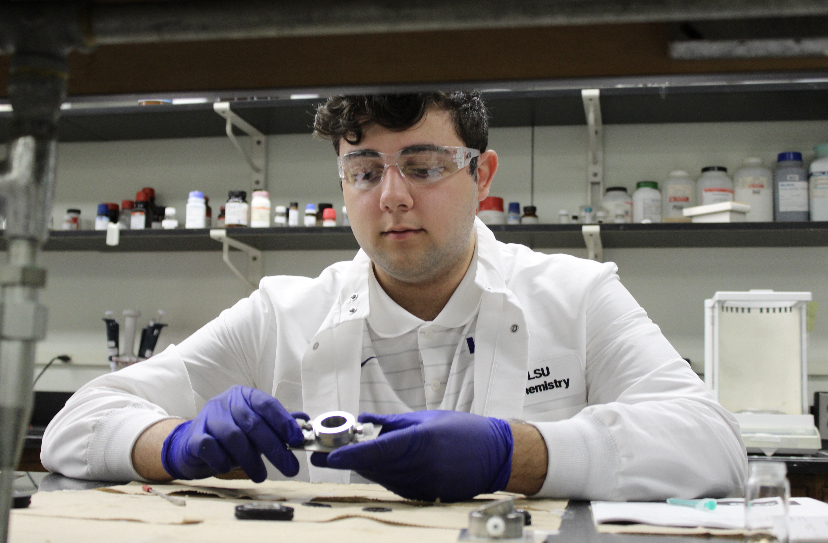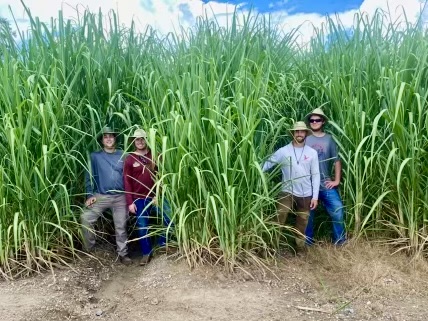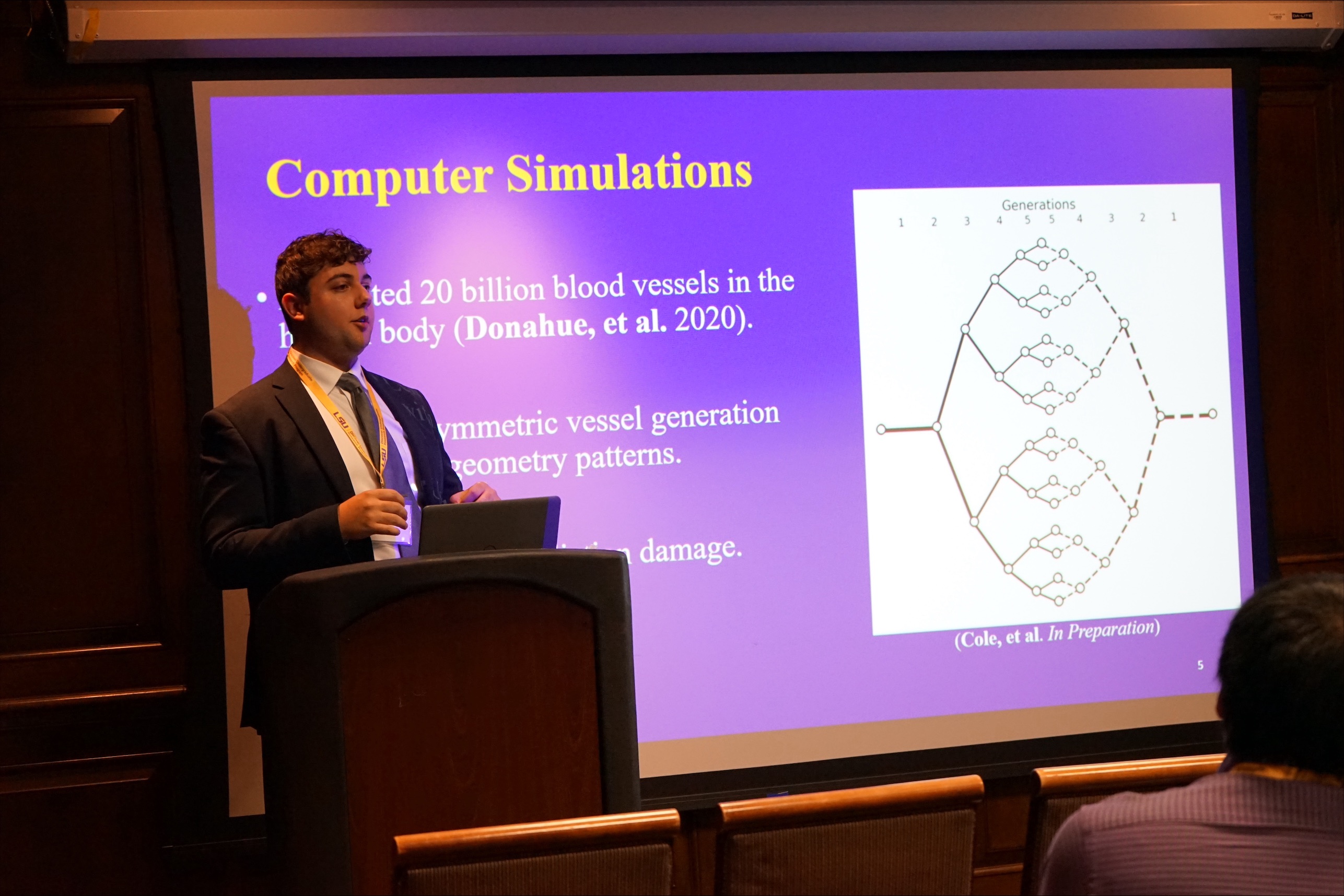From Fields to Modeling: Navigating the Unexpected Journey to Becoming a Researcher
April 24, 2024

Christian Foti is a junior Chemistry major with a Physics minor, a MARC student, and Vice President of Leadership for Omicron Delta Kappa (ODK).
Very few people know what they want to do when they get to college and, as a first-generation student, I was no exception.
Majoring in chemistry, I found myself arriving at LSU’s campus with no clue of what I was going to do for the next four years. The only thing I was certain of was that I was not going to do another sweltering summer working at my dad’s furniture store.
In my quest for a summer activity, Brayden Blanchard, a longtime friend, and a PhD student, messaged me asking if I wanted a summer job at the LSU AgCenter Sugar Research Station.
Knowing nothing about sugarcane and being a naïve freshman, I took the job as it was something different for me to do for a summer. Little did I know that I was trading the comfort of the shade for the relentless heat in the field.
While my grasp of sugarcane science saw only a modest improvement, I saw firsthand the ins and outs of being a graduate student and what it meant to be a scientist, learning not only from Brayden but also from the master’s students Zachary Taylor and Warner Simon. It was during this student worker position that I realized I wanted to go to graduate school and pursue academic research.
Naturally, being a chemistry student, I thought that my love for research would be through good-ole wet bench chemistry. Now, while I love learning about chemistry, I figured out through a lot of trial and error that doing research in a chemistry lab just isn’t what I wanted to do post-grad and beyond.
At the start of the spring semester, my academic advisor introduced me to the MARC program, which helps students from diverse backgrounds find research opportunities. Around the same time, I connected with a Chief Medical Physicist who happened to be a family acquaintance, and it was through this connection that I discovered the fascinating world of medical physics.
While I found this field really interesting, I had no idea how to pursue it, especially since my chemistry degree only required general physics classes. Later that semester, during finals week, I received my acceptance email to the MARC Program and was very excited about this opportunity. It was then that I made the decision with MARC to pursue Medical Physics and reached out to a faculty advisor who conducts Medical Physics research. I then met Professor Wayne Newhauser, the director of the Medical Physics Program at the LSU Department of Physics and Astronomy, who was more than excited to let me jump on the project that he and his PhD student, Maxwell Cole, were working on.

While attempting to avoid another sweltering summer at his dad’s furniture warehouse, Christian ended up in the relentless heat of a sugar research station. Little did he know, this marked the beginning of his passionate research journey.
Professor Newhauser and his lab focus on improving the understanding of health issues that cancer patients face with radiation therapy. One big problem in treating cancer with radiation is that sometimes blood may stop flowing properly within the vessels, so tissues don't get enough oxygen, and cells may die.
Think of it as lots of pipes, such as an irrigation system carrying water to plants in a field. But for some reason, water isn't reaching some plants. We do not know why this happens, but we hope to gain better insight through modeling.
My research utilizes computational blood vessel generation coupled with radiation therapy simulations. Specifically, the project focuses on vasodilation induced by nitric oxide concentrations. I'm developing a module that integrates with vessel generation, enabling accurate blood flow rate prediction considering vasodilation.
To put it simply, we are simulating how blood vessels react to radiation by generating a computational network of vessels. My vasodilation module is just adding a layer of detail to the blood vessel modeling, as right now, we have them coded as perfectly straight pipes, which is not the case in the human body.
My goal is to collaborate with Dr. Newhauser and Max by integrating my blood flow module into their radiation simulation. This will allow us to obtain more accurate data on how radiation affects blood flow, helping future Medical Physicists and Radiation Oncologists make more informed decisions about cancer treatments.
During my research journey, I've had the opportunity to present my work at the Summer
Undergraduate Research Forum through MARC last summer, as well as at LSU Discover
Day. Another fantastic aspect of the MARC program is that I'll be heading to another
institution this summer to conduct further research.

Christian presenting his research at Discover Day, LSU's annual multi-discipline undergraduate research conference.
Personally, I find this opportunity and research fascinating because I can witness my work unfolding in real time. Bit by bit, I've seen the vessel generation and vasodilation code come to life. In my past research experiences, I often felt disconnected from my work, unable to see it materialize. Here, I can observe my work evolving in real time, right before my eyes.
In conclusion, the point I want to drive home is that becoming a researcher, or even a scientist in general, is not a straightforward path. Science by itself isn’t always straightforward.
I learned that not all science is done in a pristine white laboratory with perfectly labeled beakers. Science is counting individual sugarcane stalks in the July heat all day. Science is running a chemical reaction and not having any idea what you are going to get as a product. It is coding all day long just to run into your twentieth error because you can’t remember if it is a colon or a semicolon.
So, whether you are a freshman nearing the end of your first year of college, a senior gazing at graduation on the horizon, or somewhere in between, and you feel unsure about your science career… Keep turning those pages; eventually, you will end up where you want to be.
And you never know... Dodging another summer at your dad's warehouse could open doors to unexpected opportunities.